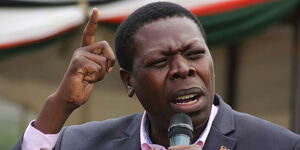Kenyans will have to pay Ksh4.78 per kilowatt hour (kWh) more in November after the latest review by the Energy and Petroleum Regulatory Authority (EPRA).
In a notice published in the November 14 issue of the Kenya Gazette, EPRA listed a series of statutory charges that have been increased, leading to this rise.
Firstly, all metre readings will be liable to a charge of 381 cents per kWh to cover the rising fuel energy cost used in the production of electricity
"Pursuant to clause 1 of Part III of the Schedule of Tariffs 2023, notice is given that all prices for electrical energy specified in Part II of the said Schedule will be liable to a fuel energy cost charge of plus 381 Kenya cents per kWh for all meter readings to be taken in November 2025," the notice read.
Next, Kenyans will need to part with another 95.89 cents per unit as a result of foreign exchange fluctuation adjustment.
"Pursuant to Clause 2 of Part III of the Schedule of Tariffs 2023, Notice is given that all prices for electrical energy specified in Part II of the said Schedule will be liable to a foreign exchange fluctuation adjustment of plus 95.89 cents per kWh for all meter readings taken in November 2025," another gazette notice read.
Additionally, EPRA has applied 1.29 cents per kWh more to be remitted to the Water Resource Management Authority (WRMA) levy.
"Pursuant to Clause 5 of Part III of the Schedule of Tariffs 2023, Notice is given that all prices for electrical energy specified in Part II (A) of the said Schedule will be liable to a Water Resource Management Authority (WRMA) levy of plus 1.29 cents per kWh for all meter readings taken in November 2025," the notice read.
This means that households used to using 50 units per month will have to pay Ksh237.5 more for their electricity bill this month.
This is in addition to four other charges applicable to all electricity purchases, including a 16 per cent Value Added Tax (VAT).
An EPRA Levy, currently charged at 3 cents per unit, will also be applied to the electricity charges, as well as a Rural Electrification Programme (REP) Levy, which amounts to five per cent of the costs of the units consumed by the customer.
An inflation adjustment charge, which fluctuates according to both domestic and international inflation rates, is also often charged, and it is reviewed every six months on January 1.












